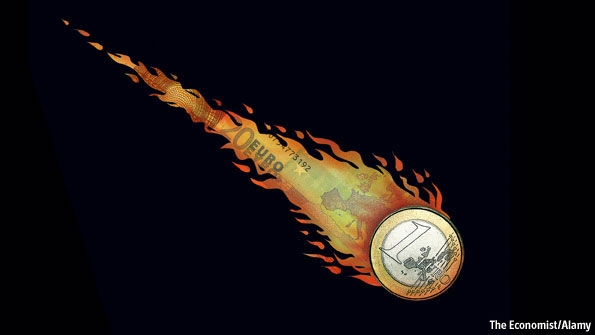The euro zone: Is this really the end?
Unless Germany and the ECB move quickly, the single currency's collapse is looming
EVEN as the euro zone hurtles towards a crash, most people are assuming that, in the end, European leaders will do whatever it takes to save the single currency. That is because the consequences of the euro's destruction are so catastrophic that no sensible policymaker could stand by and let it happen.
A euro break-up would cause a global bust worse even than the one in 2008-09. The world's most financially integrated region would be ripped apart by defaults, bank failures and the imposition of capital controls (see article). The euro zone could shatter into different pieces, or a large block in the north and a fragmented south. Amid the recriminations and broken treaties after the failure of the European Union's biggest economic project, wild currency swings between those in the core and those in the periphery would almost certainly bring the single market to a shuddering halt. The survival of the EU itself would be in doubt.
Yet the threat of a disaster does not always stop it from happening. The chances of the euro zone being smashed apart have risen alarmingly, thanks to financial panic, a rapidly weakening economic outlook and pigheaded brinkmanship. The odds of a safe landing are dwindling fast.
David Fuller's view This is an appropriately dramatic cover
picture and an excellent leader by The Economist. It says what many people have
been saying recently but with visual impact and the added weight of The Economist's
reputation. We can be reasonably certain that this cover story will be noticed
by German and other EU politicians, bureaucrats and the European Central Bank.
The
time for brinkmanship is fast running out. Various commentators, in dismissing
calls for the ECB to do more, often repeat the refrain: "It is not in its
mandate". This will no longer suffice.
The
ECB will either be remembered for its splendid Austrian orthodoxy in upholding
a narrow mandate while presiding over the demise of the currency union for which
it was created, or for doing what central banks are supposed to do in being
the lender of last resort.
A dilemma
in dealing with this or any other financial crisis is that politicians and central
bankers usually move at considerably slower speeds than markets. For this reason
I have often described politicians and central bankers as reactive rather than
anticipatory. They are often behind the curve of events, appear crisis oriented
and must scramble to catch up when events appear to be spiralling out of control.
That
is where we are today, despite months of crisis meetings for various European
officials. The growing perception, with which I agree, is that the ECB needs
to be much more active… now!
This
recent item
from the Financial Times: ECB eyes longer term for banks, is a step in
the right direction. Here is the opening:
The European
Central Bank could offer banks loans lasting up to two or three years under
plans being looked at to give extra support to the eurozone banking system.
The introduction of longer term liquidity facilities would be part of an escalated
ECB response to the eurozone debt crisis and difficulties banks face raising
crucial funding. Another option being considered is broadening the range of
assets banks can use as collateral to obtain ECB funds.
The ECB is under pressure from eurozone politicians to step up its government
bond purchases. But boosting instead its support for banks would prove far less
controversial, especially in Germany, where the Bundesbank has voiced strong
opposition to any move seen as weakening the incentives for fiscal reforms.
We can expect the flurry of political activity to continue.



